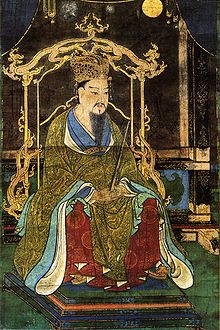Ten'ō
Ten'ō (天応) was a Japanese era name (年号,, nengō,, lit. "year name") after Hōki and before Enryaku. This period started in January 781 and ended in August 782.[1] During this time, the emperor was Kammu-tennō (桓武天皇).[2]
Events of the Ten'ō era[change | change source]

- 22 December 781 (Ten'ō 1, 3rd day of the 12th month): In 11th year of the reign of Emperor Kōnin's reign (光仁天皇11年), he abdicated. The succession (senso) was received by his son.[3] Soon after, Emperor Kammu is said to have accepted the monarch's role and duties and powers (sokui).[4] This was confirmed in ceremonies.[5]
Related pages[change | change source]
References[change | change source]
- ↑ Nussbaum, Louis-Frédéric. (2005). "Ten'ō" in Japan Encyclopedia, p. 960.
- ↑ Nussbaum, "Kammu Tennō," p. 464; Titsingh, Isaac. (1834). Annales des empereurs du Japon, pp. 86-95; Brown, Delmer et al. (1979). Gukanshō, pp. 277-279; Varley, H. Paul. Jinnō Shōtōki, pp. 148-150.
- ↑ Titsingh, pp. 85; Brown, p. 277.
- ↑ Titsingh, p. 86
- ↑ Varley, p. 44; a distinct act of senso is unrecognized prior to Emperor Tenji; and all sovereigns except Jitō, Yōzei, Go-Toba, and Fushimi have senso and sokui in the same year until the reign of Emperor Go-Murakami. Compare Imperial Household Agency (Kunaichō), Ceremony of Accession (Sokui-no-Rei); retrieved 2011-12-19.
Other websites[change | change source]
- National Diet Library, "The Japanese Calendar" -- historical overview plus illustrative images from library's collection
| Ten'ō | 1st | 2nd |
|---|---|---|
| 781 | 782 |
| Preceded by: Hōki |
Era or nengō: Ten'ō |
Succeeded by: Enryaku |
